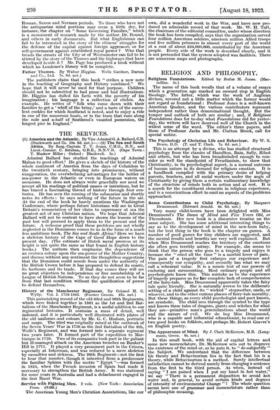RELIGION AND PHILOSOPHY.
Religious Foundations. Edited by Rufus M. Jones. (Macmillan. 5s.) The name of this book recalls that of a volume of essays which a generation ago marked an onward step in English theology. The latter, which was the work of Anglican divines, covered not a little matter which the former would not regard as foundational : Professor Jones is a well-known American Quaker, and the various contributors represent independent rather than denominational thought. But the temper and outlook of both are similar ; and, if Religious Foundations does for to-day what Foundations did for yesterday, the writers will have deserved well of the Church in the widest sense of the word. The editor's three papers, and those of -Professor Jacks and Mr. Clutton. Brock, call for special notice.
The Psychology of Christian Life and Behaviour. By W. S. Bruce, D.D. (T. and T. Clark. 7s. 6d. net.) This is an attempt by a divine, who has studied structural psychology from the classics of Hamilton, Bain, Sully, Ribot and others, but who has been broadminded enough to consider as well the standpoint of Freudianism, to show that Christianity, in its psychological aspect, is a normal outcome of human nature in its demand for religious emotion. It is a handbook compiled with the primary desire of helping parents, teachers, and all social workers under the aegis of Christianity by giving them a certain rudimentary knowledge of the structure of minds 'both in action and at rest. It is a search for the constituent elements in religious experience, and is a conscientious effort to omit no aspects of the problems approached.
Some Contributions to Child Psychology. By Margaret Drummond. (Edward Arnold. 4s. 6d. net.) Very many child-lovers have been delighted with Miss Drummond's The Dawn of Mind and Five Years Old, or Thereabouts. Her new book is a discursive treatise on the same subject. She has some additional interesting things to say as to the development of mind in the new-born baby, but the best thing in the book is the chapter on games. A number of good games for tiny children are suggested, and the mental results and benefits are very well explained. But when Miss Drummond reaches the territory of the emotions she often goes terribly astray. For example, she seems to think that the person •who goes to a tragedy and enjoys it because she " cried all the time " is a morbid lover of pain. The pain of a tragedy first enlarges our experience and consequently our sympathy, and secondly has what we may call a 'rehearsal value. It is a mimic test of our powers of enduring and surmounting. Most ordinary people and all psychologists know this. This mistake as to the experience of tragedy prepares us for her complete lack of comprehension of the fairy-tale. Miss Drummond apparently takes 'the fairy tale quite literally. She is naturally averse to the deliberate setting of a child against its " wicked " stepmother, uncle, or whoever, and to the other curious phases of fairy-tale morality. But 'these things, as every child psychologist and poet knows, are symbolic. The child sees through the symbol to the type and knows these tales of dragons, giants and witches for what they are—primitive man's ,generalizations about the world and the nature 'of evil. We do beg Miss Drummond, who is a capable and influential educationist, to read one or two good books on folklore, and perhaps Mr. Robert Graves's on English poetry.
The Appearance of Mind. By J. Clark McKerrow, M.B. (Longmans, Green. 6s. net.) In this small book, with -the aid of capital letters and some new nomenclature, Dr. McKerrow sets out to disprove the existence of the mind or, as he puts it, to " de-subjectify " the Subject. We 'understand that the difference between his theory and Behaviourism lies in the fact that his is a theory, while Behaviourism is a method. Surely intellectual satisfaction cannot be derived merely from changing a sentence from the first to the third person. As when, instead of saying " I am pained when I put my hand in hot water," we say " There is a permanent disposition to :avoid hot water and, in general, to avoid certain kinds and degrees of intensity of environmental Change " 1 The whole question seems here one of grammar and nomenclature rather than of philosophic meaning.


































 Previous page
Previous page